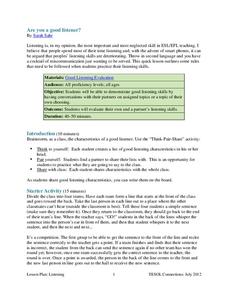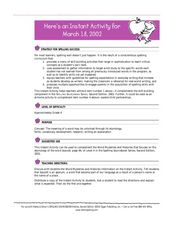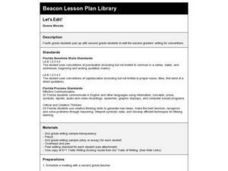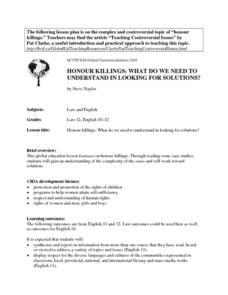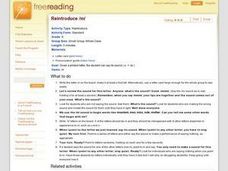California Department of Education
Workplace Skills
What skills do employers look for in potential employees? Introduce scholars to the skills that pay the bills during the second of six career and college readiness lesson plans. Once they have defined critical 21st-century skills, groups...
Curated OER
Paradise Lost: Picture Book Activity
Readers of Paradise Lost draw parallels between Milton's tale and Gene Zion's Harry the Dirty Dog, an illustrated children's book.
TESOL
Are You a Good Listener?
Your learners talk to each other every day, but are they really listening? Use a lesson based on listening skills to ensure that class members feel heard and respected. It includes games, discussion topics, and self-assessment tools...
California Department of Education
What Matters to Me?
Whether you're a self-starting entrepreneur or a cubicle commando, finding a career that suits your personality is a must! The second lesson in a series of five career and college lesson plans focuses on work ethic and values. Learners...
California Department of Education
My Dream Career
Is your job a dream come true? Career seekers research to discover what their ideal jobs might be in the second of five career and college readiness lessons for sixth graders. After determining their occupational clusters, individuals...
California Department of Education
Transitioning to High School
How do scholars prepare to take their next big step? The second in a series of six career and college readiness activities focuses on making a smooth transition from middle to high school. Groups research the resources available at their...
Curated OER
Elizabeti's Series--Classroom Guide
Second graders explore the books in the Elizabeti Series. In this reading comprehension lesson, young readers discuss pre-reading focus questions about their feelings on the first day of school. They investigate the book and describe the...
Agency for Toxic Substances and Disease Registry
Don't Mess with Mercury (Lesson B)
At one point, people thought mercury was therapeutic for humans, but now we know it is highly toxic. The second of three activities covering mercury focuses on its health hazards if humans are exposed. Pairs research and answer questions...
California Department of Education
Gaining by Giving
Community service is a win-win! Scholars discover how to gain valuable career skills through helping others using a instructional activity about volunteer work. Second in a six-part career and college readiness series, the activities...
Curated OER
Lawyers, Guns and Meaning
Students examine why they either do or do not have guns in their own household and how guns affect their sense of safety. They explore the controversy surrounding how best to interpret the Second Amendment by reading and discussing the...
Curated OER
The Second Draft of History
Pupils draft entries about a recent historical event for a history textbook using two specific sources of information. They then compare their entries and examine the differences.
Curated OER
Unlocking Word Meanings
Fourth graders investigate eponyms in the English language. In this eponym lesson plan, 4th graders participate in a teacher led lesson plan on the definition of an eponym. They complete a worksheet in which they determine which eponym...
Curated OER
The Enemy that Never Was
Students conduct research and explain in a speech why Japanese Canadians were not a threat to Canada during the Second World War.
Alabama Learning Exchange
Welcome to our Classroom
Second graders create a classroom resource book for substitutes to help them feel more comfortable and familiar with faces and procedures in our classroom and school. They develop skill in using a digital camera and computer technology.
Alabama Learning Exchange
Nouns, Verbs, and Describing Words
Second graders photograph items in their school and write a sentence that describes the items. They use different colored fonts when word processing the sentence to highlight nouns, verbs, and adjectives.
Curated OER
Quit Smoking-Together We Can Do It!
Students explore how tobacco threatens the health of smokers and non-smokers. They research smoking and second hand smoke using the Internet. Students create a Quit Smoking brochure. They present a computer slide show to describe how...
Curated OER
Let's Edit!
Students in fourth grade pair up with students in second grade to edit writing convension.
Curated OER
Honour killings: What do we need to understand in looking for solutions?
Learners prepare a chart with four columns: things we know, things we think we know but need to check, things we wonder about, and new things we have learned. Each group is given a case study and they discuss the three cases of "honor...
Curated OER
New words in the dictionary
Students examine how language evolves. They discover that language reflects changes in society. Students guess the meaning of words. In a group activity, students become wordsmiths by inventing new words. Students devise alternative...
Curated OER
QuickTime Science Project
Fifth graders divide into teams and select a simple science topic to explain and illustrate. They should pick a topic that they can illustrate with a very short (about 15-20 seconds) video clip, or QuickTime movie.
Curated OER
Compound Words
For this compound words worksheet, students analyze two columns of words and draw a line from the word in the first column to a word in the second column to make compound words.
Curated OER
Reintroduce /M/
Students study language. In this letter identification lesson, students practice pronouncing and recognizing the letter "m." They work as a group to actively particpate in various drills the teacher presents. This lesson includes links...
Curated OER
Introduce /i/
Students explore the letter i. In this language arts instructional activity, students practice saying the sound of the letter i. Students discuss words that begin with the letter i.
Curated OER
Introduce /f/
Students explore the letter f. For this language arts lesson, students discuss the sound /f/. Students practice saying the sound and identify words that begin the the sound.




